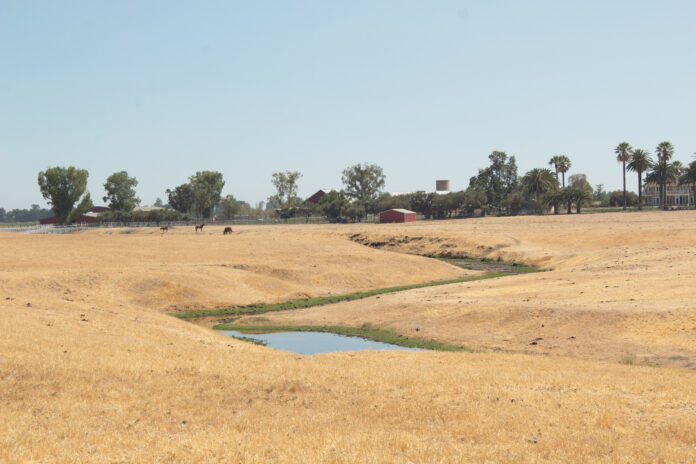The proclamation is one of many measures that are being taken throughout Yolo County to address drought conditions
On July 30, due to exceptional drought conditions, Yolo County issued an emergency proclamation for unincorporated areas of the county. Due to little rainfall, historically dry conditions and exceptionally warm temperatures, the county is urging all residents and businesses to conserve water.
Yolo County emergency services manager, Dana Carey, explained that in addition to there being an acknowledgement that a particular emergency exists, issuing an emergency proclamation for unincorporated areas allows the county to take more measures in response to drought conditions.
“[A proclamation] gives the Board of Supervisors and County staff protections legally for their response,” Carey said via email. “It can always be expanded on so that if the water situation gets worse we can enact mandatory conservation measures or place a moratorium on actions that could lead to additional water usage.”
Carey explained that Yolo County is currently taking several different measures to help Yolo County residents in this state of emergency.
“Right now Yolo County is collecting dry well reports [to verify] that each well is in fact dry,” Carey said. “If a pump can be lowered or repaired we can provide technical assistance to get the homeowner connected to companies that may be able to help them.”
If a well is dry, the county can either connect individuals to already existing programs or communicate the specific needs of a particular case if such a program does not exist, Carey said.
“If it is dry we are trying to connect people to existing programs,” Carey said. “If there isn’t an existing program for their need we are feeding the information up to the Governor’s Office of Emergency Services, Assembly offices and Senators offices that a need exists for a new program to be built—especially when we see a repetitive need that is not being addressed.”
Currently, it is not certain when this emergency will be lifted, according to Carey.
“I would expect to stay in this emergency until we see a considerable improvement in the groundwater measurements throughout the County,” Carey said. “As of right now they are steadily decreasing each day with little recovery.”
Sacramento also responded to drought conditions and water shortages, continuing their efforts that began in July.
According to an article in the Sacramento City Express, the city is cutting back on irrigation in parks in an effort to reduce the city’s water usage.
While the city will continue to irrigate gardens, trees, cemeteries, golf courses and sports fields, areas such as lawns and picnic locations will see a decrease in irrigation.
Department of Utilities Media and Communications Specialist Carlos Eliason explained that overall this change is welcome among city leadership and residents alike.
“What’s interesting about our parks is that our city council and leadership, along with residents, are pretty favorable toward our water conservation efforts,” Eliason said. “Having brown areas of grass become unique signifiers that we are in a drought.”
Reducing the amount of water being used in public parks is not the only measure that the city is taking to address drought conditions, according to Eliason.
“The water shortage contingency plan outlines different ways we can make certain water use reductions—we are in stage one of that plan,” Eliason said. “Certain city departments do what they can to reduce water up to 5%, and parks are a big part of water usage.”
In addition to the measures being taken by the city, Eliason urged residents to watch their everyday water consumption.
“The majority of water use is outside of the home—it is important for homeowners when watering lawns or landscapes to check their sprinklers and make sure that no water is being wasted,” Eliason said. “Fixing leaks in your irrigation system is also one of the biggest things homeowners can do to save water.”
City water consumers can also take advantage of the water conservation rebates, Eliason added.
“We have water conservation rebates available on our website as a way to save water and money,” Eliason said. “This includes things like irrigation upgrades, toilet upgrades or converting grass to drought-tolerant landscapes.”
Written by: Yan Yan Hustis Hayes — city@theaggie.org







